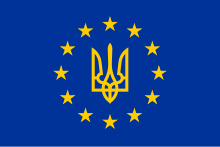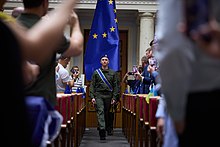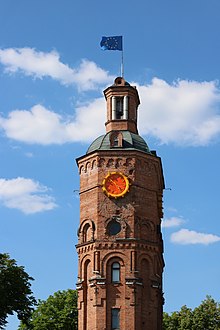Accession of Ukraine to the European Union
[3] European Commission president Ursula von der Leyen stated that she supports Ukrainian accession, but that the process would take time.
[7][8] On 23 June 2022, the European Parliament adopted a resolution calling for the immediate granting of candidate status for EU membership to Ukraine.
[11] It is one of nine current EU candidate countries, together with Albania, Bosnia and Herzegovina, Georgia, Moldova, Montenegro, North Macedonia, Serbia, and Turkey.
In particular, Polish Foreign Minister Adam Rotfeld stated on 21 March 2005 that Poland would support Ukraine's European integration aspirations under any circumstances.
However, on 9 October 2005, the European Commission, in a new version of the Development Strategy Paper, stated that the implementation of enlargement plans (Croatia and the former Yugoslav Republics) could block the accession of Ukraine, Belarus and Moldova.
"Any mention of the prospect of Ukraine's accession to the European Union has been excluded from the draft enhanced Ukraine-EU agreement due to France's position," wrote the influential German newspaper Frankfurter Allgemeine Zeitung.
Thus, during the election campaign in this country, the government of Silvio Berlusconi gave diplomatic signals that he was ready to support Ukraine's European integration aspirations.
[42] 27 June 2014 The President of the European Commission Jose Manuel Barroso stated that the Association Agreement is the beginning of Ukraine's accession to the EU.
[44] In March 2016, President of the European Commission Jean-Claude Juncker stated that it would take at least 20–25 years for Ukraine to join the EU and NATO.
[46][47] At the X session of the Ukraine–Poland–Lithuania Interparliamentary Assembly, which ended on 8 June 2019 in Kyiv, the parties signed a final document containing an agreement on the strategy of 2025 and 2027 as a period for Ukraine's possible accession to the EU.
In February 2021, the leader of the presiding Christian Democratic Union of Germany, Armin Laschet, who was considered a likely successor to Angela Merkel as Chancellor of Germany, supported the idea of EU enlargement and giving Ukraine a European perspective:[49]"The question of Ukraine's accession to the EU does not arise at the moment, but it will inevitably arise in the future.
"Quite a few experts believe that in times of deteriorating relations between Russia and the EU,[50] Ukraine has a window of opportunity to join the European Union.
Pavlo Klimkin noted that Ukraine still does not meet any criteria for joining the European Union, as it does not have an established democracy, rule of law and a full-fledged market economy.
The document highlights both the main successes of Ukraine on this path, as well as failures or moments that hinder the reform process in the country.
Slovakian prime minister Eduard Heger also proposed to the EU to create a new special procedure for Ukrainian accession, in order to help Ukraine get back on its feet and recover from the war in the future.
[63] On the same day, Hungarian foreign minister Péter Szijjártó called for Ukraine's accelerated accession to the European Union.
[4] On 9 March, the Polish Senate adopted a resolution calling on the countries of the European Union to support the accelerated process of Ukraine's accession to the EU with 93 votes in favor.
Von der Leyen presented Zelenskyy with the legislative questionnaire to begin Ukraine's application and offered to fast-track the process.
[5] Borrell announced that the EU delegation to Ukraine, headed by Matti Maasikas, will return to Kyiv after it was evacuated at the outbreak of war.
[70][71] After a meeting with Volodymyr Zelenskyy on 16 June in Kyiv, the leaders of Germany, Italy, Romania and France called for immediate candidate status for EU membership for Ukraine.
[72] Federal Chancellor of Germany Olaf Scholz noted that Ukraine's further movement into the EU, if all countries agree to grant it candidate status, depends on its own efforts.
[74] On 17 June, Foreign Minister Jeppe Kofod said that the Danish government is ready to support granting Ukraine candidate status for EU accession if the European Commission provides a positive recommendation.
[75] The Netherlands on the same day appealed to the European Commission with a call to carefully prescribe the conditions for Ukraine's further approach to EU membership.
[85] On 22 June, EU Neighbourhood and Enlargement Commissioner Olivér Várhelyi provided an oral update on Ukraine's progress toward the seven reforms.
[87] The 2023 enlargement package report, released by the European Commission on 8 November, provided another update on Ukraine's progress towards these reforms, with four of the seven criteria assessed as having been completed.
"[113] 91% of Ukrainians support joining the European Union during the Russian invasion of Ukraine,[114][115] according to a poll conducted by the Rating Sociological Group on 30–31 March 2022,[116] up from 66.4% in February 2015.
[117] According to a survey conducted by Ifop commissioned by the Yalta European Strategy and the Fondation Jean-Jaurès from 3–7 March 2022, Ukraine's accession to the EU is supported by 92% of respondents in Poland, 71% in Italy, 68% in Germany, and 62% in France.
[119] According to a poll commissioned by the New Europe Center, which has European Pravda, among those who have decided on their position, 68% of Germans, 65% of French, and 65% of Dutch people were in favor of granting Ukraine a candidacy.





